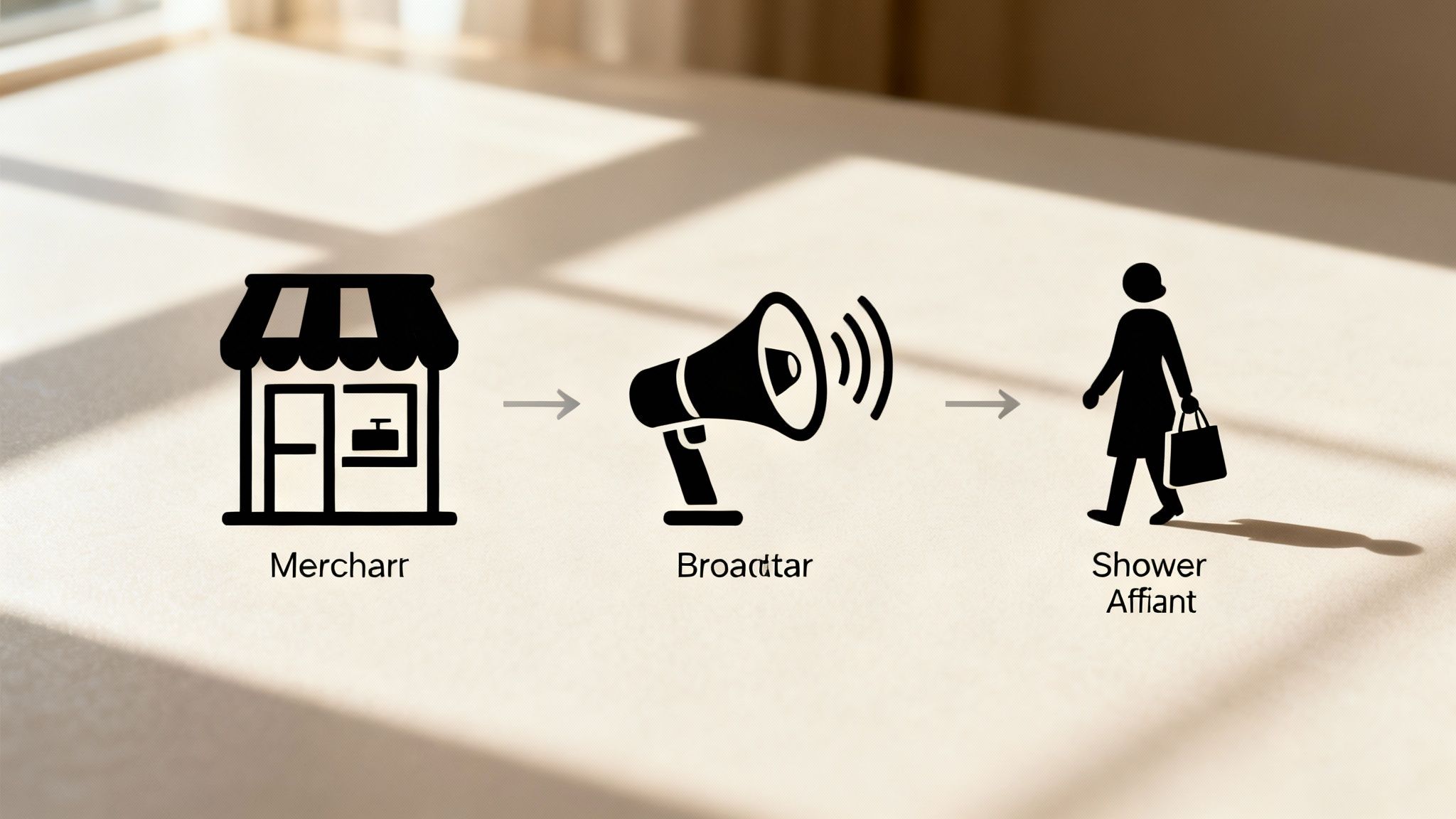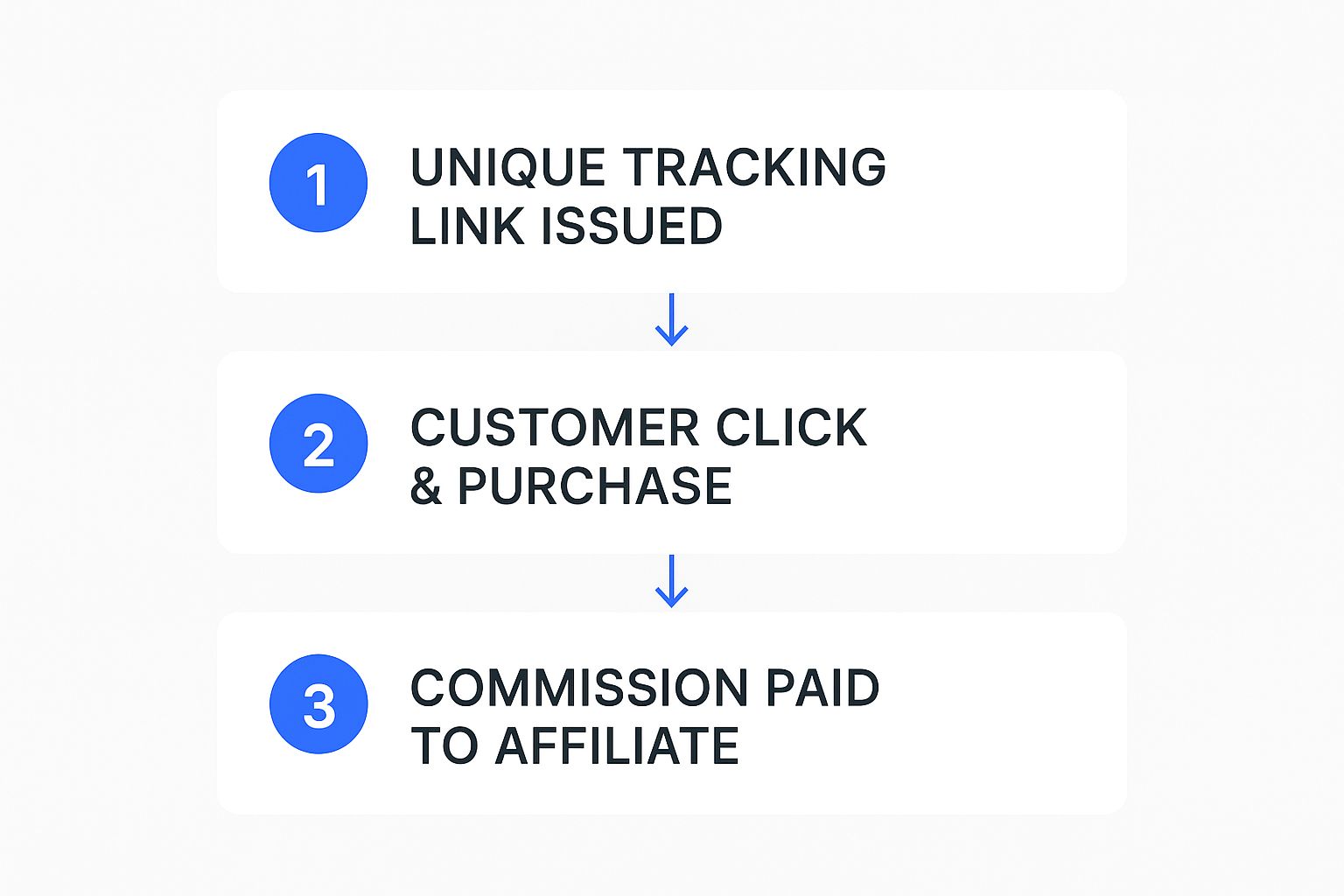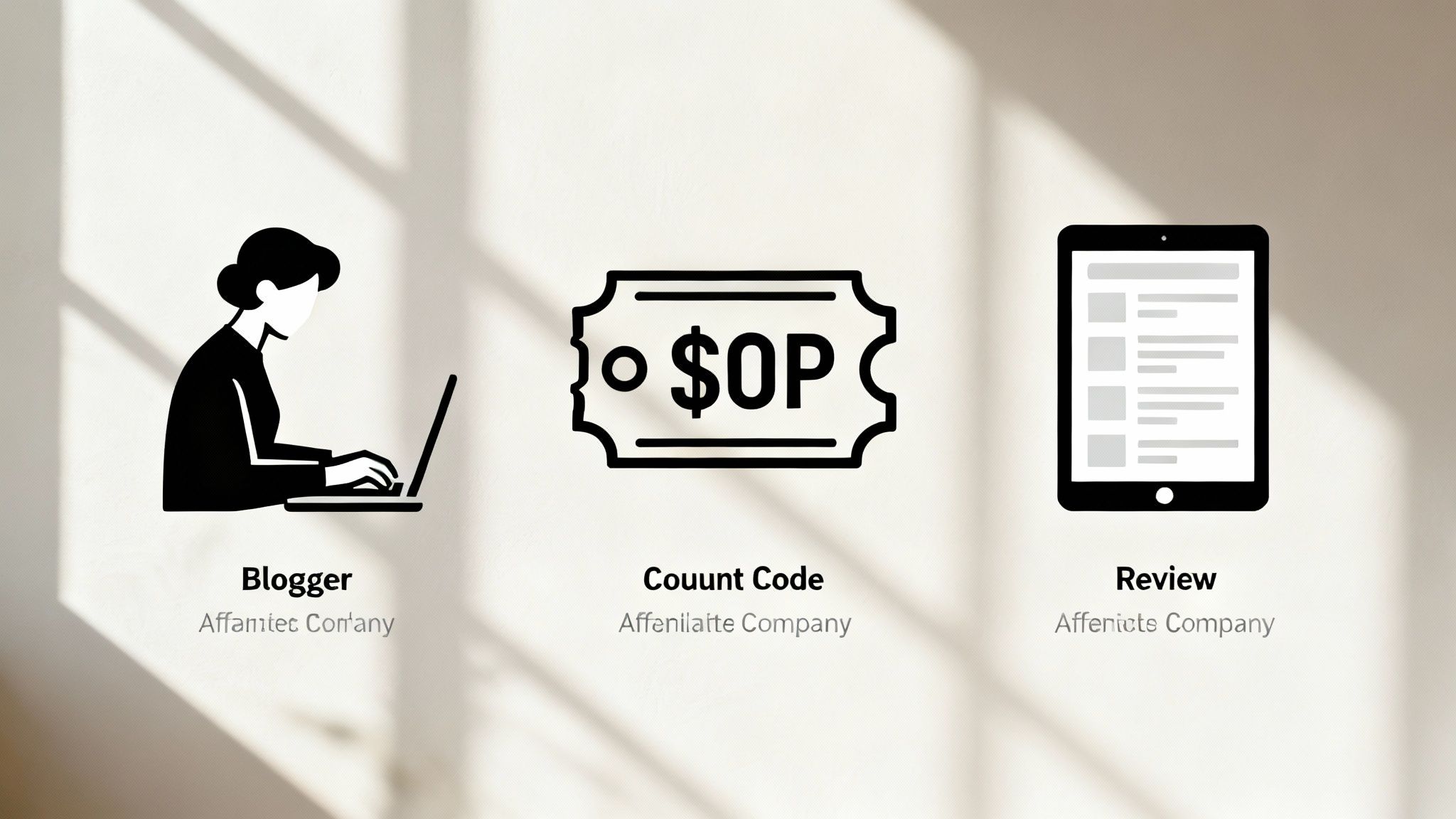What Is an Affiliate Company Explained
What Is an Affiliate Company Explained
Ollie Efez
October 09, 2025•12 min read

Think of an affiliate company as a freelance salesperson for the digital age. They're a business or an individual who earns a commission by promoting another company's products. It's a simple, powerful idea: they get paid when their recommendation actually leads to a result, like a sale.
How Affiliate Companies Actually Work

At its heart, this is all about performance-based marketing. A business, often called the merchant, teams up with a promoter, known as the affiliate, to get their products or services in front of more people. This affiliate could be anyone from a popular blogger, a product review site, or a social media creator to a major media outlet.
And this model isn't just a niche strategy—it's exploding. The affiliate marketing industry was valued at a huge $15.77 billion in 2021 and is on track to hit $27.78 billion by 2027. It's growing fast for a reason. You can learn more about affiliate marketing industry growth and what it means for new programs.
The Key Players in an Affiliate Partnership
To really get what an affiliate company is, you need to understand the three core players that make these partnerships tick. Each one has a specific job to do, and when they work together, the system runs like a well-oiled machine. Our glossary offers a deeper dive into the role of an affiliate in marketing.
Let's break down who does what in a typical partnership.
The Key Players in an Affiliate Partnership
This setup is a win-win-win. The merchant only pays for real results, which makes it a super-efficient and low-risk way to grow. The affiliate earns money by sharing great products with their audience, and the customer finds new solutions recommended by a source they already trust.How Affiliate Partnerships Actually Work
At the heart of every affiliate partnership is a special tracking link. You can think of it as a unique digital fingerprint that ties a specific affiliate to every customer they send your way. This link is the linchpin of the whole system, making sure every referral gets tracked and the right person gets paid.
Let's walk through a quick example. Imagine a tech blogger, Alex, joins an affiliate program for a new project management tool. As soon as Alex is accepted, the software company gives them a unique URL. This isn't just any old link—it has a special tracking code, Alex's affiliate ID, tacked onto the end.
From there, the process unfolds in a simple, three-step cycle.

As you can see, the journey starts with that unique link and ends with a commission payment, which really gets to the core of this performance-based model.
The Customer Journey and Tracking
So, Alex writes an in-depth review of the software, showcasing its best features and how it helped their workflow. They then place their affiliate link in the article, encouraging readers to check it out. When someone clicks that link, a tiny file called a cookie is saved to their browser.
This cookie has one job: to remember that Alex sent them. Even if the person doesn't buy right away, that cookie usually stays active for a specific timeframe, often 30 to 90 days. If they come back and purchase the software within that window, Alex still gets the credit. This is the essence of first-click attribution, a model where the first touchpoint that brought in the customer gets all the credit.
The whole system is built on fairness and accuracy. It makes sure the affiliate who sparked the initial interest gets compensated for the value they provided, no matter when the actual sale happens.
This model is more than just clever—it’s incredibly effective. Today, about 81% of brands have an affiliate program, and they see an average return of $6.50 to $15 for every dollar invested. That kind of ROI is a clear signal of just how powerful this can be for growth. You can see more in this breakdown of affiliate marketing ROI.
What Kinds of Affiliate Companies Are Out There?

When you hear "affiliate company," you might picture a massive corporation, but the reality is much more diverse. The term covers a huge range of promoters, from solo creators to full-blown media sites, each with its own way of connecting with an audience.
They all share one core mission: create value for a specific group of people and then monetize that attention through smart, helpful product recommendations. While many use a mix of strategies, they usually fall into a few main categories.
Content Creators and Niche Experts
This is the classic affiliate you probably already know. Think of your favorite bloggers, YouTubers, or podcasters who dive deep into a specific topic. A tech expert who writes exhaustive tutorials on WordPress hosting, for instance, earns a commission when their readers sign up for a recommended host.
What makes them so effective? Trust and authenticity. They spend months or years building a loyal following by being genuinely helpful. When they recommend a product, it doesn't feel like a pushy sales pitch; it feels like a trusted friend giving solid advice.
An affiliate company is anyone who has an audience's attention and can guide that audience toward a purchasing decision. It's a business model based entirely on trust and relevance.
Review and Comparison Sites
On a larger scale, you'll find dedicated review and comparison websites. These are the go-to resources when you're trying to choose the best project management tool or the right email marketing platform for your business. They act as impartial guides, simplifying complex buying decisions.
These sites are built to attract people who are ready to make a purchase, and they do it by focusing on a few key things:
- Comprehensive Data: They do the heavy lifting by compiling features, pricing, and customer feedback into easy-to-scan tables and in-depth articles.
- Targeted SEO: They are masters of search engine optimization, ranking for high-intent phrases like “best CRM for small business” to capture motivated buyers.
- Objective Analysis: The most successful review sites maintain their credibility by offering a balanced view, highlighting both the pros and cons of each product.
Coupon and Deal Sites
Then there are the coupon and deal aggregators. These platforms are magnets for bargain-hunters, collecting all the latest promo codes, discounts, and special offers in one place.
Their audience is laser-focused on one thing: price. This makes them a fantastic source of quick conversions, especially during big sales events like Black Friday. The strategy is simple but powerful: give people a direct path to saving money.
Why Businesses Build Affiliate Programs
Let's break down why so many companies are jumping on the affiliate marketing train. It really boils down to one powerful idea: performance-based marketing.
https://www.youtube.com/embed/XGd-hPmvU80
Instead of sinking money into traditional ads and just hoping they work, affiliate marketing flips the script. You only pay a commission after an affiliate delivers a specific result, whether that’s a completed sale or a solid lead.
This model is a game-changer because it dramatically lowers your financial risk. You're not just buying clicks or impressions; you're investing directly in outcomes. This makes affiliate marketing one of the most efficient and scalable ways to drive real growth, even if you don't have a massive budget to start with.
Cost-Effective Customer Acquisition
Beyond the low-risk structure, affiliate programs are a fantastic way to get your brand in front of new audiences. Affiliates have already put in the time and effort to build credibility and trust with their followers.
When one of these trusted sources recommends your product, it’s not just an ad—it’s a powerful endorsement. That kind of social proof is something traditional advertising simply can't buy.
By partnering with a trusted affiliate company, you're not just buying an ad; you're borrowing the trust and authority that the affiliate has spent years building with their audience.
This targeted approach has a massive impact. In fact, affiliate marketing is responsible for an incredible 16% of all online orders in the U.S. and Canada, which shows just how potent this channel is. You can discover more insights about its e-commerce impact and see the numbers for yourself.
As an added bonus, these partnerships often generate high-quality backlinks from authoritative websites, giving your SEO a nice, organic boost.
To put it all in perspective, here’s a quick look at how affiliate marketing stacks up against some other common marketing channels.
Affiliate Marketing vs. Traditional Advertising
The core philosophy behind affiliate marketing is fundamentally different from channels like paid search or content marketing. Where traditional ads often require a significant upfront investment with no guarantee of return, affiliate marketing is built on paying for actual performance.
This table highlights some of the key distinctions:
Ultimately, while channels like PPC and content marketing have their place, affiliate marketing offers a uniquely low-risk and scalable path to acquiring new customers. You're tapping into established audiences and only paying for what works.Real-World Examples of SaaS Affiliate Partnerships

Theory is one thing, but seeing how affiliate companies operate in the wild is what really makes the concept stick. The SaaS world, in particular, is full of great examples—from huge media companies to solo experts who’ve built entire businesses around their recommendations.
These partnerships prove that affiliate marketing is so much more than just dropping links. It’s about becoming a trusted guide for a specific audience. When you get that right, everyone wins.
Large-Scale Review Publications
You've definitely seen these in action. Think about the big tech review sites that publish massive comparison guides for project management tools or CRM platforms. These are classic examples of large-scale affiliate companies.
Their whole business model is built on creating detailed, data-backed content that helps other businesses make smart buying decisions.
They pull this off by:
- Ranking for High-Intent Keywords: They go after search terms like “best accounting software,” which puts them in front of people who are ready to buy right now.
- Building Unbiased Credibility: By offering balanced reviews and side-by-side comparisons, they position themselves as an objective source. That credibility makes their recommendations incredibly powerful.
At its core, a successful affiliate company doesn't just sell products; it sells clarity. By simplifying complex decisions, affiliates build the trust needed to drive conversions for their partners.
Niche Content Creators
On the other end of the spectrum, you have individual creators. A YouTuber who specializes in video editing software, for instance, might create tutorials and review new gear. Over time, they build a loyal following that hangs on their every word.
When that creator recommends a particular editing suite or a cool new plugin using their affiliate link, their audience pays attention. This is a perfect example of a solo entrepreneur acting as a highly effective affiliate company.
If you're looking for inspiration, you can explore a wide range of affiliate programs for software designed for niche experts. Whether it's a huge publication or a one-person show, the lesson is the same: trust is the ultimate currency.
Frequently Asked Questions About Affiliate Companies
As you start to wrap your head around the affiliate model, a few questions always pop up. It's a simple concept on the surface, but the details can get a little fuzzy. Let's clear the air on some of the most common points of confusion.
Getting these distinctions right is crucial. In the world of digital marketing, a lot of terms get thrown around interchangeably, but the small differences have a big impact. Nailing these concepts down is the first step to building an affiliate strategy that actually works.
Are Affiliates and Influencers the Same Thing?
Not quite, but it’s easy to see why people mix them up. The biggest difference comes down to how they make money and what their main goal is.
An influencer’s job is to build a following and shape their audience's buying habits. They often get paid a flat fee for sponsored posts or brand mentions. The payment is for the exposure itself.
An affiliate, on the other hand, lives and dies by performance. They only get paid when someone clicks their unique link and completes a specific action—usually a sale or a qualified lead. Many influencers do use affiliate links to earn extra income, but not every affiliate is an influencer.
The core difference is the payment model. Influencers often get paid for their reach and potential impact, while affiliates only get paid for measurable results. This makes affiliate marketing an incredibly powerful and low-risk channel for businesses.
How Do Affiliate Companies Get Paid?
While the payment models can vary, they almost always fall into one of three buckets. Each one is designed to reward a different kind of result, so companies can pick the one that best fits their goals.
Here are the most common structures:
- Pay-Per-Sale (PPS): This is the gold standard of affiliate marketing. The affiliate earns a percentage of the revenue every time someone they referred makes a purchase. It’s simple and directly tied to sales.
- Pay-Per-Lead (PPL): Instead of a sale, the affiliate gets paid for delivering a qualified lead. This could be someone signing up for a free trial, booking a demo, or even just subscribing to a newsletter.
- Pay-Per-Click (PPC): This one is less common these days, but the affiliate earns a small fee for every single click their link receives, whether it converts or not.
Can a Single Person Be an "Affiliate Company"?
Yes, absolutely. Don't let the word "company" throw you off. It really just refers to the business entity, and many of the most successful affiliates are one-person operations.
Think of passionate bloggers, niche content creators, or industry experts who have built a trusted audience. They operate as a business of one, monetizing that trust by recommending products they genuinely believe in. These individuals are a perfect example of how a single person can build a powerful and highly effective affiliate company.
Ready to build and scale your own affiliate program? LinkJolt provides all the tools you need to manage partnerships, track performance, and automate payouts with ease. Start your free trial of LinkJolt today.
Watch Demo (2 min)
Trusted by 300+ SaaS companies
Start Your Affiliate Program Today
Get 30% off your first 3 months with code LINKJOLT30
✓ 3-day free trial
✓ Cancel anytime